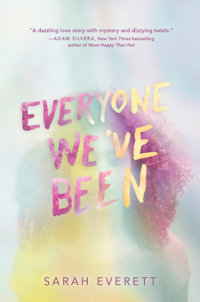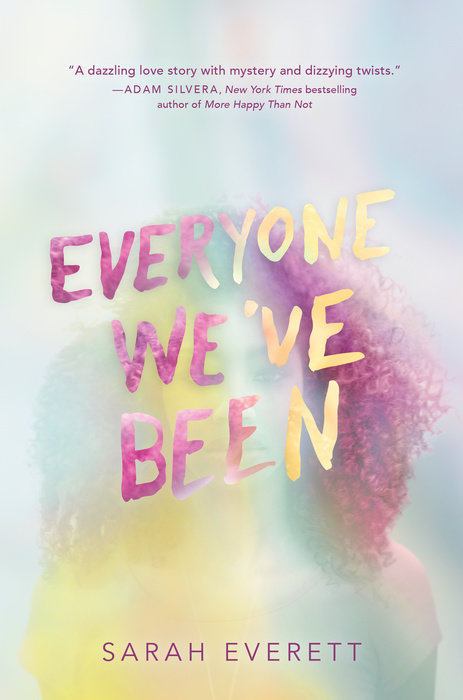Everyone We've Been
"Everyone We've Been is a dazzling love story with mystery and dizzying twists. Sarah Everett's puzzle of a debut will easily hook readers as they piece together this consuming tale of hope and heartbreak."
-Adam Silvera, New York Times bestselling author of More Happy Than Not
"Addictive, charming, and full of surprises, EVERYONE WE'VE BEEN is a gorgeously written novel about our mistakes and how we recover from them."
--Adi Alsaid, author of LET'S GET LOST and NEVER ALWAYS SOMETIMES
For fans of Jandy Nelson and Jenny Han comes a new novel that will be hard to forget.
Addison Sullivan has been in an accident. In its aftermath, she has memory lapses and starts talking to a boy who keeps disappearing. She's afraid she's going crazy, and the worried looks on her family's and friends' faces aren't helping.
Addie takes drastic measures to fill in the blanks and visits the Overton Clinic. But there she unwittingly discovers it is not her first visit. And when she presses, she finds out that she had certain memories erased.
Flooded with questions about the past, Addison confronts the choices she can't even remember and wonders if you can possibly know the person you're becoming if you don't know the person you've been.
An Excerpt fromEveryone We've Been
1
On the first turn, I think about my orchestra uniform: a knee-length black skirt, soft and silky between my fingers.
On the second turn, a stack of sheet music, pieces I’m halfway through learning or planning to learn.
On the third turn, I slam into the seat in front of me. The boy three rows ahead jerks forward, too, but it’s a backpack he guards instead of a viola case.
On the fourth turn, the world bursts with noise. Smattering applause of broken glass. A startled scream from a little girl. Yellow streetlight that is too bright and thick and long. The trees whirl around us; it’s hard to tell whether they are gliding around on a sheet of ice or we are.
Finally we stop spinning.
There is no sound.
2
AN HOUR EARLIER
An hour earlier
About thirty miles outside of Caldwell, we pick up the last set of passengers. An elderly Asian couple and a teenage boy who looks about my age--seventeen. The couple sits in the second row closest to the doors, but the boy keeps walking through the aisle, rubbing his palms together and breathing on his hands to warm them.
He scans the bus as he enters the aisle, surveying the seating options. There are five or six other passengers, a small enough number that we’re not wrestling for armrests or invading each other’s personal space, which is the single worst thing about public transportation, especially on Saturdays. I’m near the back of the bus, just in case we get a surge of people.
The boy passes the drowsy-looking college student on the left whose jet-black hair flops down over his eyes. He stops a few rows from my seat, on the right side of the aisle.
Behind me, a mother shushes one of her two elementary-school-age kids.
I watch as the boy peels his backpack off his shoulders and places it on the seat closest to the window. The backpack is half unzipped, the short metal legs of a tripod sticking out. He glances up at me, catching my eye, just as I’m about to look away.
“God, it’s cold,” he says, rubbing his palms over his shoulders.
“I know, it’s freezing,” I say back disappointingly. Uninterestingly.
I notice that he’s completely underdressed for this cold. His hair is tucked under a black wool beanie, but he’s wearing a thin cotton shirt pushed up at his elbows. No coat, no scarf. How has he not frozen to death?
“Jackets help,” I blurt out, past the acceptable response time. Then add in a slightly more normal voice, “Or so I’ve been told.”
The boy assesses me and breaks into a grin that takes up his whole face as he looks down at how he’s dressed. “Hmm. I might have to try that one of these days.” His smile makes a funny feeling slide through my stomach. He hesitates a moment, then sits with his back to me, three rows ahead.
I pull out my phone to check the time and see three texts from my mom, asking how the trip is going and what time the bus arrives so she can pick me up from the station. I send her a quick response before sticking the phone back in my pocket.
“What do you play?” the boy asks a few minutes later, turning his entire upper body around to face me. He nods at the case occupying a seat next to me. The bus to Caldwell this morning got me there four hours before the concert started, so I’d brought my viola in case I found somewhere to practice and kill time while I waited.
“The viola,” I say. Why do I always spend so much time hoping someone will talk to me, only to have absolutely nothing to say when they do?
Presumably just to witness my verbal ineptness, Goth College Guy rouses a little and turns back to look at me. He blinks a few times, then turns around again.
“I don’t know one thing about the viola,” the boy says, grinning at me. I know I’m on a concert high--“outside my lane,” as my pilot father might say--because something about the grin elates me. His smile is so easy, his face so open, that I feel like he must do it a lot--which, of course, ought to put me back inside my lane. He probably smiles like this at everyone.
But staying firmly in the wrong lane, I smile back and speak a little more quietly, in case anyone is trying to sleep.
“Well, they look a lot like violins but they’re not.” I hear myself quickly going down the path of many Violas Are Not Violins activists who have gone before me, so I change directions. “Rumor has it that Jimi Hendrix started off playing the viola.”
“Really,” the boy says, and, God bless him, pretends to be interested.
“Yeah. I actually just came from watching a concert,” I say, wanting to keep the conversation going. “Not Jimi Hendrix. Obviously.”
“Obviously,” the boy repeats, teasing, and something flutters inside me again.
“Pretty sure dead people don’t have concerts.”
I might be rambling, but he is playing along. “I’ve never been invited to one,” he says.
I laugh. It slips out quickly, without permission, and Goth Guy rouses again to glare at me. But the boy looks pleased he’s made me laugh.
I drop my voice to a whisper. “Unless it’s just that they’re exclusive. Think how many people would pay to see a Ghost Mozart concert,” I joke. Then, sobering up, I add, “It was actually this orchestra at Samberg Auditorium.”
“Were they any good?”
“They were incredible,” I say.
My mind swivels back to the performance, especially to the second movement of that Bach orchestral suite. I could see why it had become famous as “Air on the G String.” Through that dark, echoing auditorium, the sound stretched across all the empty space and reeled me in closer. A long musical finger, crooked at me.
I’d heard it before, but there was something about that piece. Something different and powerful. I’d clung to the armrests until the very last note ended.
Now I blink back into reality, realizing the boy is still looking at me.
“What about you?” I ask, embarrassed by my lapse in attention. “Where are you coming from?”
He looks out the dark window then and tugs on his hat. “Long story, but my piece-of-shit car wouldn’t start.”
He grins again as he speaks, and I wonder if “piece-of-shit” is actually code for a Lamborghini and why blood rushes to my face every time he smiles.
“That sucks,” I say.
He shrugs. The kids at the back of the bus are arguing over something while their mom threatens to confiscate it. It feels awkward to keep talking across three rows, so the boy turns back to face the front and I finally force myself to pull out Great Expectations, the book we’re discussing in English class.
We stop for gas at Riverton, and the boy gets off behind the driver. The mom, a short woman with light brown hair to the middle of her back, shepherds her kids down the aisle.
“I don’t waaaanna go to the bathroom,” the little girl whines, her brother following her, skipping between the seats. The girl’s hair is almost identical in length and color to her mother’s. The mother gives me this look I can’t explain when she walks past me, then hurries her kids along.
When I squint out the window, I see the boy standing next to the bus driver, smoking. Both of them march in place, trying to stay warm, tufts of cigarette smoke intermingling with the clouds of their breath. It’s judgmental of me, but the discovery of Smiling Boy’s nicotine problem makes it easier to dismiss any connection we might have shared. He’s a random boy on a bus in the middle of January.
The family comes back on first, and I feel the mother’s gaze on me again, but this time she jerks her eyes away when I look up. As if she’s embarrassed to have been caught staring. She walks to the back of the bus and retrieves a sweater and backpack, then the three of them relocate to the very front of the bus, opposite the couple.
I wonder what her problem is. I self-consciously check the cover of my book. Does Great Expectations have some reputation for being super racy that I’m not aware of?
My face is back in my book when the boy and bus driver get on again, but the letters quickly blur into meaningless squiggles, and I doze on and off for the next hour.
I wake up to the spinning.
The bus sliding out of control, careening off the road. The other passengers screaming. Underneath it: the sound of sharp things breaking and blunt things--heads, elbows, backs--slamming.
Then I’m flying forward, falling. A sharp, hard pain pierces the side of my head.
Everything goes black.

